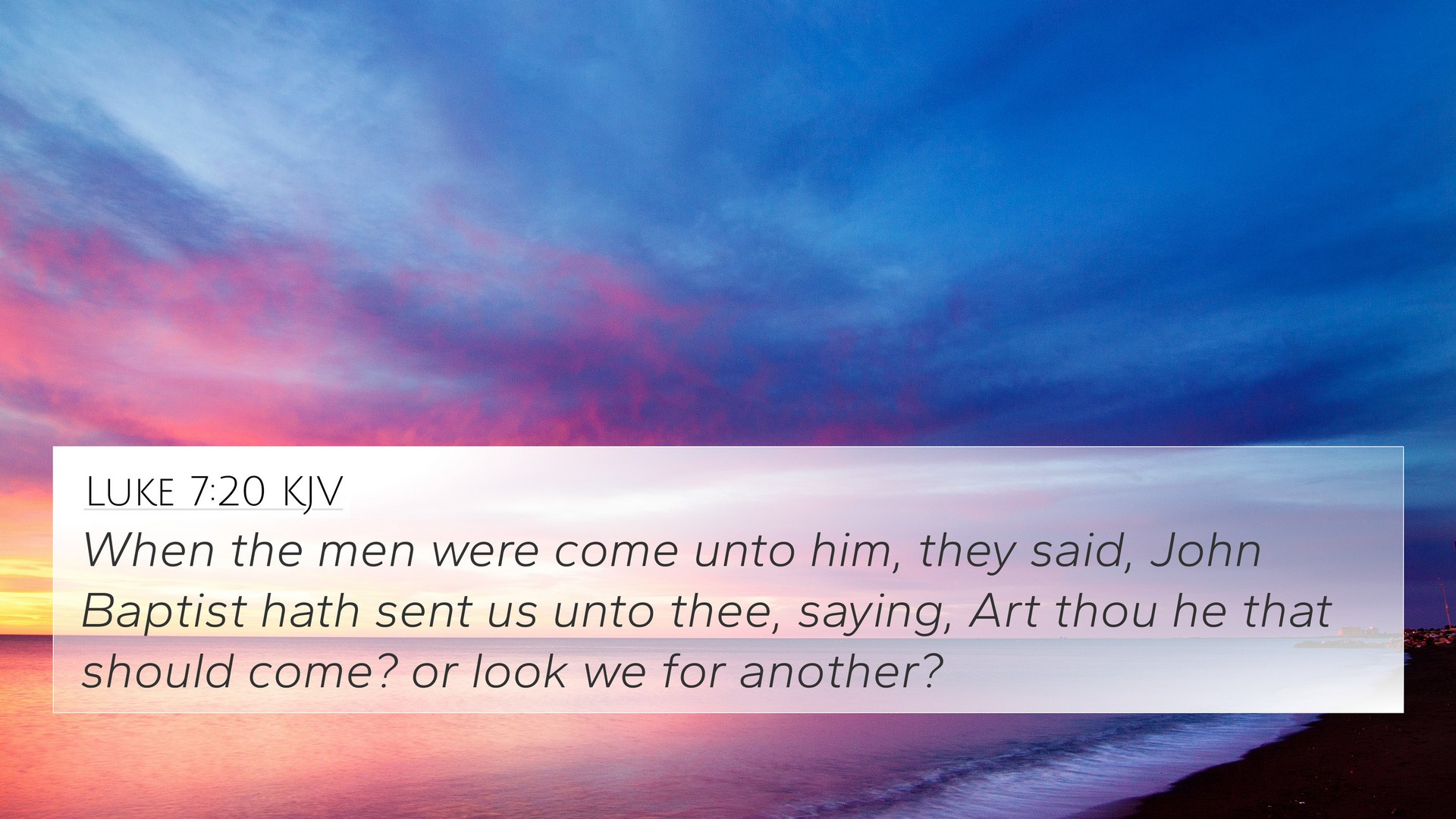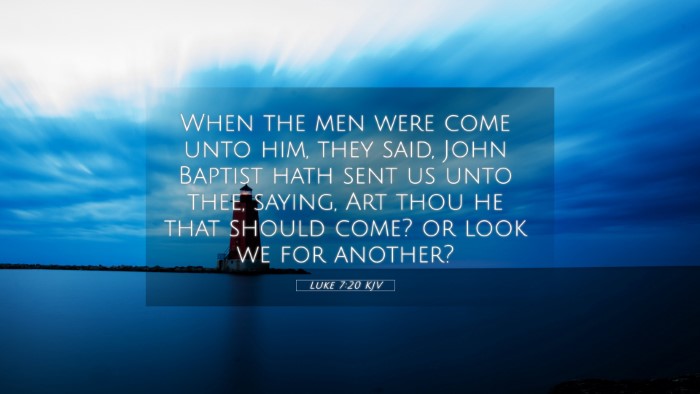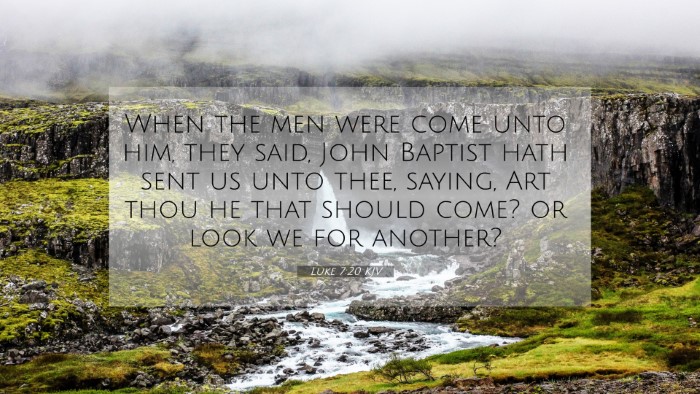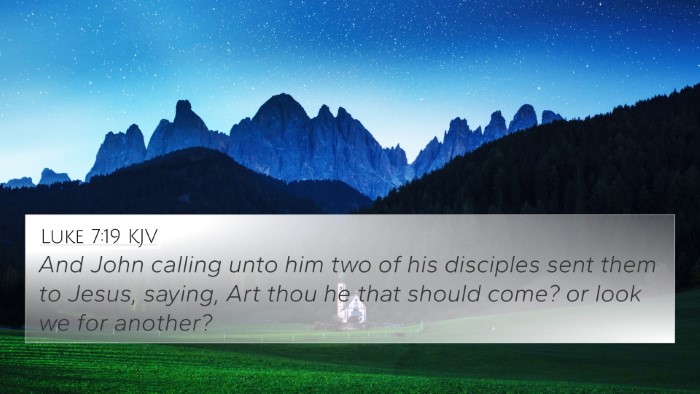Understanding Luke 7:20
Verse Reference: Luke 7:20 - "When the men had come to Him, they said, 'John the Baptist has sent us to you, saying, "Are You the Coming One, or do we look for another?"'
Overview of the Passage
This verse captures a significant moment in the Gospel of Luke where John the Baptist's disciples inquire of Jesus whether He is the promised Messiah. The inquiry reflects John’s own moment of doubt while imprisoned and the need for reassurance about Jesus' identity and mission.
Commentary Insights
- Matthew Henry's Commentary:
Henry highlights that John the Baptist, despite his previous declaration of Jesus as the Lamb of God, experienced doubt in dire circumstances. His inquiry illustrates a human tendency to seek confirmation during uncertainty. John’s question serves as a bridge to fulfill the prophetic expectations of the Messiah.
- Albert Barnes' Notes:
Barnes notes the significance of John's question as both a moment of inquiry and a test of faith. He emphasizes that the question 'Are You the Coming One?' shows both a recognition of Jesus' role and a deeper longing for the Messiah's kingdom. This reflects theological implications about the nature of Christ's ministry.
- Adam Clarke's Commentary:
Clarke delves into the context of John's imprisonment, suggesting that this situation led to John's uncertainty. He underscores that John's disciples were carrying out their leader's orders by seeking clarity about Jesus' identity. Clarke also connects this moment to prophetic fulfillment and the challenges of faith.
Thematic Connections
This verse serves as a crucial link in the New Testament, embodying the theme of doubt, faith, and revelation. The inquiry parallels other scripture and highlights the ongoing revelation of God’s plan through Jesus. The following connections can be identified:
- Matthew 11:3 - A similar inquiry from John's disciples emphasizing doubt about Jesus’ identity as the Messiah.
- Isaiah 61:1-2 - Prophetic texts that outline the Messiah's mission, reinforcing Jesus’ role.
- Luke 4:18-19 - Jesus’ declaration of His ministry aligns with the prophecies about the Coming One.
- John 1:29 - John's earlier recognition of Jesus as the Lamb of God, contrasting with his doubts.
- Acts 13:25 - Reflects John’s role and recognition of Jesus before his death, showing continuity in their missions.
- Matthew 3:11 - John’s own declaration about Jesus as more powerful, which heightens the irony of his doubts.
- Mark 1:7 - Reinforces John’s witness to Jesus’ identity and the anticipation of the Messiah.
Bible Cross-References Related to Luke 7:20
- Luke 3:16 - John proclaims Jesus’ superiority in baptism.
- John 10:42 - Reference to the works of Jesus contributing to faith in Him.
- Isaiah 35:5-6 - Prophecy about the Signs of the Messiah, reinforcing Jesus’ miracles.
- Matthew 16:15-17 - Peter’s confession of Christ’s identity adds a layer of understanding to the nature of how one comes to know Jesus.
The Importance of Cross-Referencing
The act of cross-referencing biblical texts enriches our understanding of scripture by revealing the interconnected nature of biblical themes and teachings. Tools for Bible cross-referencing, such as concordances and reference guides, can greatly aid believers seeking to deepen their faith and comprehension of God’s Word.
Benefits of Cross-Referencing
- Enhances thematic understanding of the Bible.
- Reveals the continuity and unity of scripture.
- Builds a more profound relational context and narrative of faith.
- Aids in sermon preparation and biblical study.
- Fosters deeper theological reflection and discussion.
Conclusion
In Luke 7:20, the inquiry from John’s disciples encapsulates a moment of vulnerability and a profound quest for truth. The connections to other scripture emphasized through comparative analysis and thematic exploration underscore the significance of understanding Jesus’ identity and mission as central to the Christian faith. By engaging in scriptural cross-referencing, believers not only maintain a coherent picture of biblical theology but also invite deeper reflection and personal application.
Further Exploration
To further investigate the connections between Bible verses, consider utilizing a comprehensive Bible cross-reference system or resource. Engaging in cross-referencing Bible study methods can illuminate themes, similar verses, and deepen your grasp of scripture’s message.



